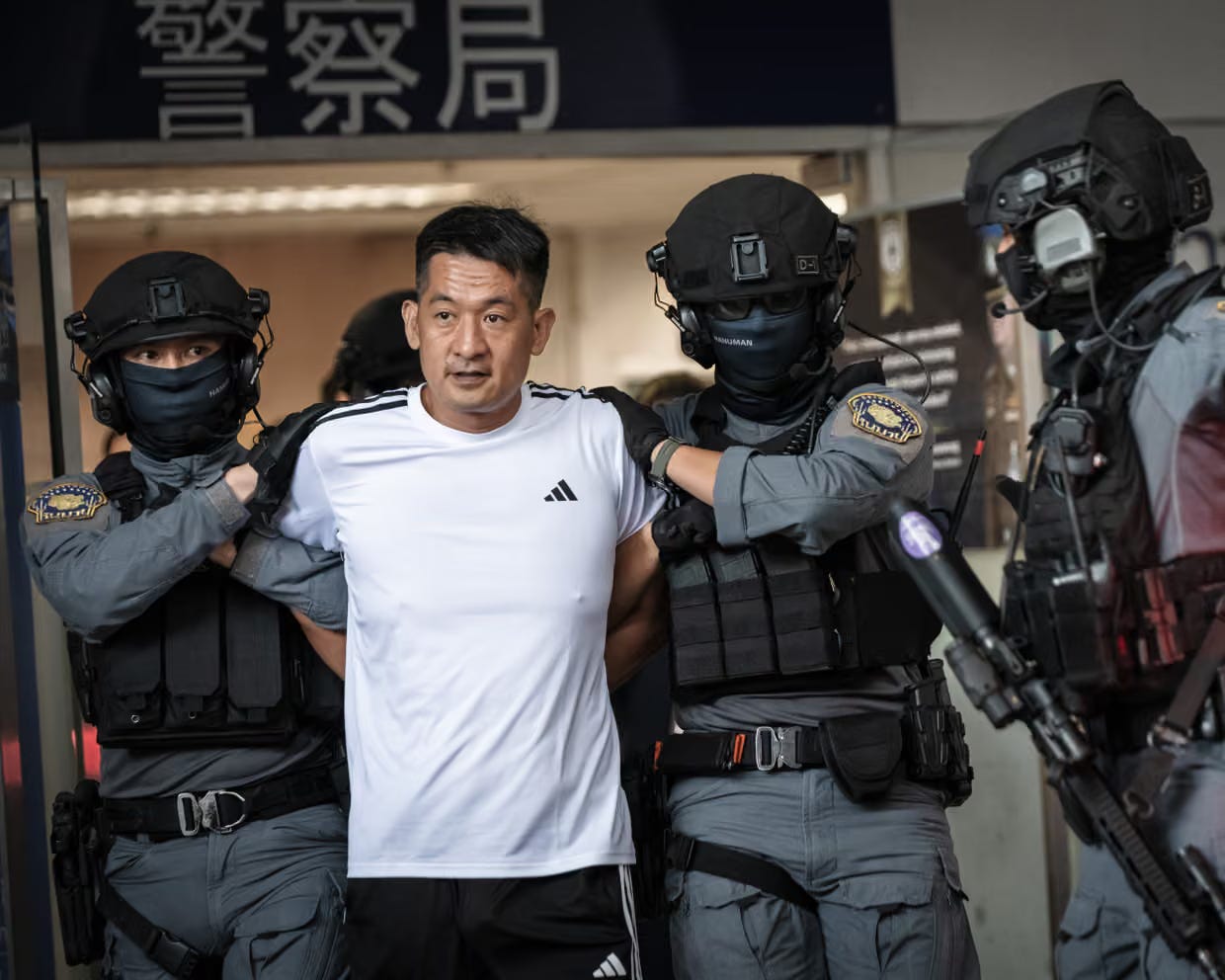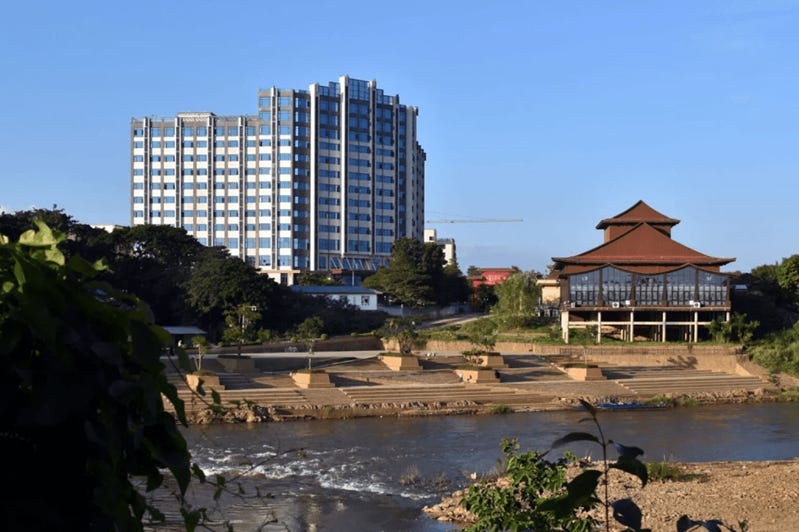US, China Spur Southeast Asian Scam Crackdown
Myanmar kingpin extradited to China, but skepticism over crackdown remains
By: Toh Han Shih
After more than a decade of rapacious scam activity, dual pressure from the US and China has led to a crackdown on operations and assets of pig butchering and gambling rings in Southeast Asia as well as Hong Kong, South Korea, and Taiwan, with coordinated raids in China, Cambodia, Laos, Myanmar, Thailand, and Vietnam.
Although the superpowers are no allies, the squeeze has caused the Myanmar military to raid Shwe Kokko, a notorious compound 40 km from the Thai border town of Mae Sot where enslaved workers defraud online victims globally, although analysts are skeptical over the junta’s seriousness.
“Both the US and Chinese governments have compelling reasons to dismantle scam operations,” Matthew Friedman, chief executive officer of the Mekong Club, a Hong Kong-based anti-slavery NGO, told Asia Sentinel. “For the US, the priority is to protect Americans from losing their life savings. For the Chinese government, the aim is to diminish the association with criminal activities that reflects poorly on their image. In situations like this, both governments can find common ground to collaborate effectively.”
Whatever the agendas of the governments are, said Patricia Ho, the founder of Hong Kong Dignity Institute, which supports the vulnerable in Hong Kong, including victims of human trafficking, “what we are seeing now is persistent pressure on the largest scam syndicates. The world cannot turn their eyes away from this until we see through the disintegration of these operations which have been perpetrating some of the most inhumane crimes we have seen outside of warzones.”
China’s Ministry of Public Security announced the raids on November 14. This year, Chinese and Myanmar police have busted the Shwe Kokko scam complex in Myawaddy town in north Myanmar, resulting in the extradition of 5,500 suspects from there to China.
At the same time, Chinese and Laotian police raided Golden Triangle complexes, arresting over 600 suspects, while Chinese and Vietnamese police nabbed 149 in Vietnam, and raids in Cambodia resulted in the extradition of 2,141 suspects to China.
This China-led crackdown follows raids in November and October on individuals and assets suspected to be linked to the Cambodia-based Prince Holding Group in Singapore, Taiwan, Hong Kong, and South Korea, as Asia Sentinel reported on November 10. Singapore police said they seized assets suspected to be linked to Prince Group, aided by information from US and UK government announcements of sanctions on Prince Group, its chairman Vincent Chen Zhi, as well as other individuals and companies.
In late November, Singapore police arrested Tan Yew Kiat, the owner of a local car leasing firm, SRS Auto, as part of an expanding probe linked to the US investigation of Prince Group, according to Singapore media reports.
In a November 11 statement, Prince Group officials “categorically reject the notion that it or its chairman, Chen Zhi, has engaged in any unlawful activity.”
Myanmar
On November 20, the Myanmar regime said it detained 1,106 foreigners from 22 countries during three days of Shwe Kokko raids near the Thai border, by troops of the Myanmar junta and the Karen Border Guard Force (BGF), the Karen State army under the control of Colonel Saw Chit Thu. The foreigners included 216 Indonesians, 184 Chinese, and 85 Ethiopians, the junta said.
The raid follows the November 12 extradition of She Zhijiang, the China-born kingpin of the Shwe Kokko empire from Thailand following his August 13, 2022 arrest in Bangkok. Even in a Thai prison, the “subject individual remotely controlled activities in Shwe Kokko,” reported pro-Beijing daily Ta Kung Pao in Hong Kong.
“A combination of Chinese pressure and US sanctions have panicked Chit Thu and the Burmese military into a public relations exercise to convince the world they are taking action,” said Mark Farmaner, the director of Burma Campaign UK, a UK-based NGO. “We are witnessing a farcical situation where they are raiding their own town to destroy facilities they helped build and which they have been profiting from.”
China and the US “seem to be acting independently, but the Burmese military and Chit Thu are clearly panicking about invoking the ire of the two most powerful countries in the world,” said Farmaner.
Saw runs the Shwe Kokko “new city” project in a joint venture with Yatai International Holding Group Limited, a defunct Hong Kong company wholly owned by She and headquartered in Bangkok, according to a recent Dignity Institute report co-authored by this writer.
Under the name Tang Kriang Kai, She was previously a director of Yatai from 7 October 2017 to 27 September 2024 when the company was struck off, according to the report. Western intelligence agencies believe She financed Saw, according to the Dignity Institute report.
In September 2017, She began developing a fraud factory in Myawaddy, reported CGTN, a Chinese state-owned media, on November 13. Under She’s direction, the criminal organization set up more than 200 online gambling platforms, attracting over 330,000 players across China and involving illicit funds exceeding RMB2.7 billion (US$370 million), said CGTN.
In 2017, when Shwe Koko was being built, Saw’s Border Guard Force provided security for the project and was under the control of the Myanmar military, Farmaner said.
Although Saw formally separated from the Burmese military last year, they are still working together, and revenue from Shwe Koko is shared between the Myanmar military and local commanders, Farmaner said. “The Burmese military uses business opportunities to bribe and play divide and rule within ethnic groups that resist their rule, while also taking a cut for themselves. This has been the case with illegal mining and logging, and most recently scam centers. In return for business opportunities, a small number of armed groups side with the Burmese military.”
“What we are witnessing is a farce, with criminals pretending to take action against their own crimes,” Farmaner commented. “One day, they might make a comedy movie about this situation, except it has caused so much suffering.”
The Burmese military, Faramaner added, “appear to be hoping that high profile raids, demolishing a few buildings, and a few arrests will be enough to create the impression action has been taken, and then they can quietly go back to business as usual. Reports that key people involved in running the scam centres were warned and taken away before the raids reinforce the impression that the Burmese military and Chit Thu haven’t given up on this lucrative source of income.”
These scam operations are easily relocatable, Ho pointed out. “A picture that comes to mind is Whack-A-Mole.”
She was wanted by the Chinese government and has been sanctioned by the US, UK, and Canada. On December 8, 2023, the UK, US, and Canada sanctioned She for trafficking humans to Shwe Kokko where they were forced to work as scammers and subjected to torture and physical abuse, alleged the UK government.
In 2014, a Chinese court convicted She of running an illegal lottery business in the Philippines that targeted Chinese online users, and had netted US$298 million in profits, according to the Dignity Institute report. In 2015, She began building an illicit business helping Chinese gamblers front-load gambling bets in Cambodian casinos, the report said. From Cambodia, he expanded his business to the Philippines and acquired ownership of one of Manila’s largest spa and entertainment centers, the report added.
Any cooperation between China and the US in fighting Southeast Asian scams would be transactional, said Andre Wheeler, CEO of Asia Pacific Connex, an Australian consultancy. From China’s perspective, Beijing would be analyzing any crackdown from the perspective of how best to keep the important Myanmar economic corridor open, particularly the access to maritime trading corridors via the Kyaukphyu deepwater port in northwest Myanmar, he explained.
“At a practical level, this would be helping the junta with military and policing assistance with controlling ethnic-based civil unrest along the corridor,” he said.
US President Donald Trump “is transactional by nature and would be using this environment to cooperate in order to gain benefits such as disrupting a drug corridor from China to the US. At a global leadership level, both (Chinese President Xi Jinping) and Trump come out with an elevated image of working to solve global issues in a cooperative manner, but in reality, both are being driven by very differing national security agendas,” Wheeler continued.
Toh Han Shih is a Singaporean writer in Hong Kong and a regular contributor to Asia Sentinel



These scam centers appear to be a natural extension of the United Front/PLA/organized crime nexus we describe in the Ye-Xi clique.
cooperation is a fine line for trump and xi because they both benefit from their own preferred venues of cybercrime.